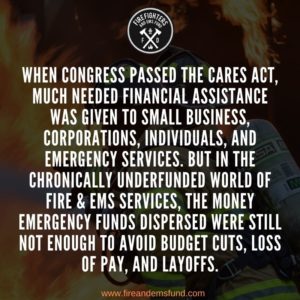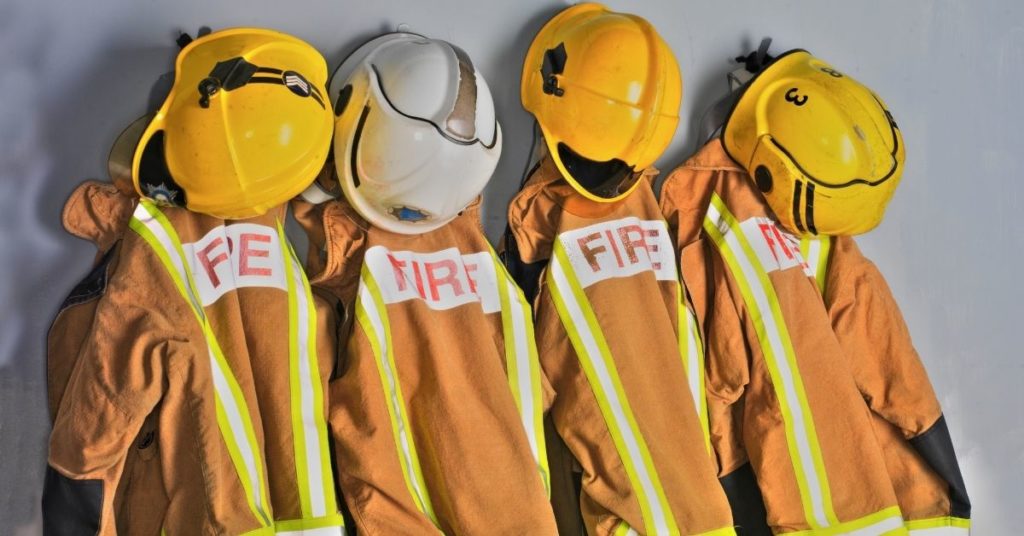America is rapidly approaching an entire year of living under Covid-19. While the obvious toll on human life has been immense, there have been other catastrophic effects from the pandemic on an economic front which are rippling through society. When Congress passed the CARES Act, much needed financial assistance was given to small business, corporations, individuals, and emergency services. But in the chronically underfunded world of Fire & EMS Services, the money emergency funds dispersed were still not enough to avoid budget cuts, loss of pay, and layoffs. For months, the government has been deadlocked in passing additional assistance, and if the past proves the future, these issues are likely to be amplified in 2021 if Congress does not pass another stimulus bill.

If no additional stimulus is passed by Congress and Covid-19 restrictions on public life remain largely the same, the first consequence will likely be additional budget cuts to public workers. In April, Urgent Communications reported that Fire Departments across the West were asked to come up with major reductions in their budgets during the first wave of Covid-19. “Fire chiefs through the western United States are being asked to propose budget cuts between 10% and 25%…as local governments try to fund operations in the face of dramatic tax-revenue declines caused by stay-at-home measures designed to slow the spread of COVID-19.” On the East Coast, Fire Chiefs from across the state of New Hampshire express fears that they will also see critical funds slashed from their budgets, as the state expects to see upwards of $500m in lost revenues due to Covid-19. In a discussion with Senator Maggie Hassan, Chief Kirk Beattie of the Laconia Fire Department was uneasy about the year ahead: “For lack of a better term, are we going to see ‘fear’ cuts?… You know we’ve weathered the storm in the first three, four months. [We’ve received] support from the federal delegation, obviously getting us some money to back up on that, but what does next year look like?” As money dries up, the unfortunate reality is that spending on public services may be first to get slashed without additional relief moving into next year.
As funds going to fire departments shrivel, it is likely that the next consequence of no Covid-19 relief would be cut pay to firefighters themselves. In May, Firefighter Nation reported that California Governor Gavin Newsom proposed making multi-billion cuts to the state’s budget to offset massive loss in tax revenues. These massive cuts included slashing the pay of hundreds of thousands of state workers. “The 10% pay cut for the more than 233,000 state workers would save about $2.8 billion and includes firefighters and health care workers.” Newsom hinged his decision to cut the budget on additional stimulus from the federal government, which of course, never was passed. In July, Wildfire Today reported that the final agreed upon cuts to firefighter pay in California amounted to 7.5%. “The deal worked out by the firefighters union, CAL FIRE Local 2881, was an overall 7.5%…a 4.4% reduction in their retirement health care, resulting in a 3.1% cut in take-home pay.” While this may not be a nationwide issue, firefighters working in tax reliant states like California may very well be vulnerable to losing pay if action is not taken to supplement revenues lost in states who have shutdown their economies the most.
Lastly, if no additional stimulus is passed massive layoffs could be a grim reality for Fire & Emergency Services across the country. President Elect-Joe Biden shares this very same concern, reports The Independent. ‘“I’m worried. The question is going to be: when do we have to start laying off?” “They can’t deficit spend,’ he said of local governments.” As noted by American Security Today, the International Association of Fire Chiefs (IAFC) has tracked the large number of layoffs going into July, and projects a record number of firefighters to be laid off going into the future. “Nearly 1,000 firefighters have been furloughed with the IAFC predicting that number will reach over 30,000 by 2022.”
With seemingly no immediate end in sight to the Covid-19 crisis in America, no additional assistance from the federal government will likely have dire consequences across many areas of American life and the economy. Aside from the immediate effects on Fire & EMS workers, our communities will inevitably suffer. Fire & EMS workers are essential. When they are affected it means worse outcomes for the people who rely on them and losses incurred from budgetary sacrifices will have far reaching consequences.
In addition to leadership, citizens can vote for state and local ballot measures which will have immediate impacts on their daily lives. In 49 states, Delaware being the sole exception, state constitutions can only be amended through ballot measures, and in 26 states, citizens can collect signatures to put forth their own ballot measures. Here are six ballot measures from this year’s elections impacting fire departments across the country.








